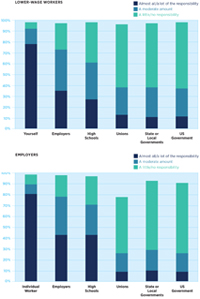
(Photography courtesy UGA College of Ag, CC BY-NC 2.0)
Middle-class positions disappeared during the recession and they’re not coming back even as the economy adds jobs.
About half of the 7.5 million American jobs that disappeared in the 2008 recession were middle-class positions, earning $38,000 to $68,000 per year. But of the 3.5 million jobs picked up since the recession ended in 2009, only 2 percent pay middle-class wages. Instead, nearly 70 percent of the economy’s job growth has been happening in lower-wage industries.
To get a better understanding of the country’s growing low-wage workforce, the UChicago-based Associated Press-NORC Center for Public Affairs Research surveyed employees making $35,000 or less and employers across a variety of low-wage sectors: manufacturing, health, retail, service, and wholesale. Researchers asked the respondents about training and education, benefits, and opportunities for advancement. They found employers much more sanguine about workers’ chances for promotions: 59 percent perceived some or a great deal of opportunity for employees to advance to higher-paying positions. By contrast, 67 percent of workers saw little or no opportunity to advance, pessimism that was especially acute among white and older low-wage employees.
Workers and employers were much more in line on accountability for employee advancement. Seventy-eight percent of workers and 81 percent of employers said most of the responsibility for getting ahead lies with the individual worker. Roughly three-fourths of both employees and employers said that employers have at least a moderate obligation to help their workers advance their careers. Both groups assigned vastly less responsibility to unions or federal, state, and local governments.
How much of the responsibility do you think each of the following groups share for helping workers get ahead in their careers?
[[{"type":"media","view_mode":"media_original","fid":"819","attributes":{"alt":"","class":"media-image","height":"687","typeof":"foaf:Image","width":"460"}}]]
Infographic

How much of the responsibility do you think each of the following groups share for helping workers get ahead in their careers?
